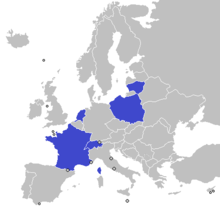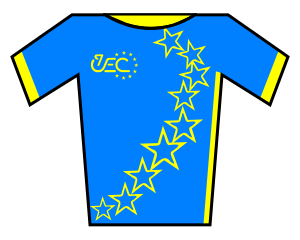UEC European Track Championships
The European Track Cycling Championships are a set of elite level competition events held annually for the various disciplines and distances in track cycling, exclusively for European cyclists, and regulated by the European Cycling Union (UEC). They were first held in their current format in 2010, when elite level cyclists competed for the first time following an overhaul of European track cycling
In line with cycling tradition, winners of an event at the championships are presented with, in addition to the gold medal, a special, identifiable jersey. This UEC European Champion jersey is a blue jersey with gold European stars.
History
Age group championships
Prior to 2010, championship events were run under the same name, but solely for junior and under-23 cyclists, and the 2010 event is recognised as the first elite level senior championships. Since 2010, separate annual European championships for under-23 and junior riders have continued, described explicitly as such.
European Track Cycling Championships have been held for junior and under-23 athletes for a long time, though records in earlier editions are incomplete. They provided useful experience for young riders with winners automatically qualifying to compete at the UCI Track Cycling World Championships in which no age limit applied, and the world's best track cyclists competed.[1]
A European Masters Track Championships also exists for riders over 35 years old.
Derny, Madison and Omnium championships
Men's European Track Championships for the "motor-paced" or "derny" track cycling discipline have been held since 1896. A separate European Madison championship event was also run for men.
Separate elite European Omnium Championships have been held since 1959, which were later incorporated into the senior European Track Championships on their introduction in 2010.[2][3]
Founding of the Elite Championships
In 2010 the UEC instigated a significant overhaul of how cyclists qualify for the Olympic Games. As a result, the European Championships was also introduced for elite level European cyclists. The first elite championships thereafter took place at the beginning of November 2010. It followed the same ten event schedule for the 2012 Olympics but also included the Madison "due to popular demand".[4]
The Under 23 and Junior championships thereafter were run as an annual separate event.
Competitions

Elite
| Year | Date | Country | City | Velodrome |
|---|---|---|---|---|
| 2010 | 5–7 November | | Pruszków | BGŻ Arena |
| 2011 | 21–23 October | | Apeldoorn | Omnisport Apeldoorn |
| 2012 | 19–21 October | | Panevėžys | Cido Arena[5] |
| 2013 | 18–20 October | | Apeldoorn | Omnisport Apeldoorn[6] |
| 2014 | 16–19 October | | Baie-Mahault, Guadeloupe | Vélodrome Amédée Détraux |
| 2015 | 14–18 October | | Grenchen | Velodrome Suisse |
| 2016 | 19–23 October | | Saint-Quentin-en-Yvelines | Vélodrome de Saint-Quentin-en-Yvelines |
| 2017 | 19–22 October | | Berlin | Velodrom |
| 2018[lower-alpha 1] | TBA | | Glasgow | Sir Chris Hoy Velodrome[7][8] |
Elite Championships all-time Medal table : 2010–2016
| Rank | Nation | Gold | Silver | Bronze | Total |
|---|---|---|---|---|---|
| 1 | | 27 | 9 | 12 | 48 |
| 2 | | 16 | 16 | 14 | 46 |
| 3 | | 13 | 19 | 14 | 46 |
| 4 | | 9 | 15 | 13 | 37 |
| 5 | | 9 | 10 | 11 | 30 |
| 6 | | 6 | 5 | 6 | 17 |
| 7 | | 5 | 9 | 7 | 21 |
| 8 | | 5 | 4 | 5 | 13 |
| 9 | | 5 | 3 | 7 | 15 |
| 10 | | 4 | 0 | 6 | 10 |
| 11 | | 3 | 7 | 4 | 14 |
| 12 | | 3 | 5 | 1 | 9 |
| 13 | | 3 | 3 | 4 | 10 |
| 14 | | 2 | 2 | 4 | 8 |
| 15 | | 1 | 3 | 1 | 5 |
| 16 | | 1 | 0 | 0 | 1 |
| 17 | 0 | 2 | 1 | 3 | |
| 18 | | 0 | 0 | 2 | 2 |
| Total | 112 | 112 | 112 | 336 | |
Juniors and U23's
| Year | Under 23 | Junior | ||
|---|---|---|---|---|
| Country | City | Country | City | |
| as European Track Championships | ||||
| 2001 | Czech Republic | Brno | Italy | Fiorenzuola |
| 2002 | Germany | Buttgen | Germany | Buttgen |
| 2003 | Russia | Moscow | Russia | Moscow |
| 2004 | Spain | Valencia | Spain | Valencia |
| 2005 | Italy | Fiorenzuola | Italy | Fiorenzuola |
| 2006 | Greece | Athens | Greece | Athens |
| 2007 | Germany | Cottbus | Germany | Cottbus |
| 2008 | Poland | Pruszków | Poland | Pruszków |
| 2009 | Belarus | Minsk | Belarus | Minsk |
| as European Track Championships (under-23 & junior) | ||||
| 2010 | Russia | St Petersburg | Russia | St Petersburg |
| 2011 | Portugal | Anadia | Portugal | Anadia |
| 2012 | Portugal | Anadia | Portugal | Anadia |
| 2013 | Portugal | Anadia | Portugal | Anadia |
| 2014 | Portugal | Anadia | Portugal | Anadia |
| 2015 | Greece | Athens | Greece | Athens |
See also
References
- ↑ Part of the European Sports Championships
- ↑ "UK European Track Championships team". Cycling News. 2001-07-11. Retrieved 2008-09-11.
- ↑ http://www.cyclingarchives.com/wedstrijdfiche.php?wedstrijdid=2019
- ↑ http://www.cyclingarchives.com/wedstrijdfiche.php?wedstrijdid=6572
- ↑ "European Track Championships". Track Cycling News. Retrieved 15 August 2013.
- ↑ sportas.delfi.lt
- ↑ 2013 Calendar
- ↑ http://www.european-athletics.org/news/article=leading-sports-bring-together-their-european-championships-2018/index.html
- ↑ http://www.reuters.com/article/2015/03/26/sports-championships-idUSL3N0WS4DK20150326
